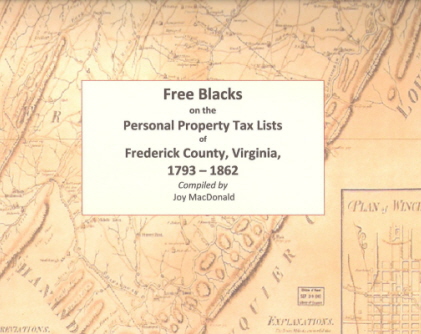
 FREE BLACKS ON THE FREDERICK COUNTY, VIRGINIA PERSONAL PROPERTY TAX LISTS, 1793-1862
FREE BLACKS ON THE FREDERICK COUNTY, VIRGINIA PERSONAL PROPERTY TAX LISTS, 1793-1862
compiled by Joy MacDonald, 2011.11x8 1/2, vi, 359 pages. Paperback; printed on acid-free stock.
The author has abstracted the information for free African-Americans in Frederick County, Virginia and has arranged them into nine categories:
Year;
last name;
first name;
age;
occupation [only given infrequently on the rolls];
spouse [infrequent];
property description & value;
district in which taxpayer resided;
notes [oftentimes describing the exact location of the taxpayer or his former owners if freed in recent decades].
This volume is provided in three separate arrangements to facilitate genealogical research by African-American families; 1) chronologically by year; 2) sorted by last name of the individual; and 3) sorted by first name.
A similar volume is in preparation for the town of Winchester, which was taxed separately from Frederick County.
Information recorded in Virginia personal property tax records provide a wealth of information regarding the social status of an individual. The early laws required the tax commissioner in each district to record in "a fair alphabetical list" the names of the person chargeable with the tax, the names of white male tithables over the age of twenty-one, the number of white male tithables between ages sixteen and twenty-one, the number of slaves both above and below age sixteen, various types of animals such as horses and cattle, carriage wheels, ordinary licenses, and even billiard tables. Free Negroes are listed by name and often denoted in the list as "free" or "FN." By the 1850s, the personal property tax records contained detailed descriptions of personal property owned.
The most frequent use of personal property tax records is for the direct information recorded: name of the property owner, type and quantity of property owned, and amount of tax paid. Comparative analysis of personal property tax records from year to year may lead to conclusions about social, economic, and agricultural history, as well as the status of certain individuals or groups of property owners within a locality.
For genealogical researchers, personal property tax records may provide important data. Individuals with the same names in a locality may be distinguished by a junior or senior, residence in different tax districts, or geographical location. Parentage may be expressly or implicitly stated by either the name or number of male tithables between the ages of sixteen and twenty-one in the household of the taxpayer. The names of women appear occasionally when owning property in their own right or as the widow of a property owner. By studying the lists from year to year, researchers may trace an ancestor to determine the date of departure from a locality, or possibly the year of death. The name of a taxpayer will continue on the tax list, noted as "deceased" or "estate," until the estate is settled.
[FBFC] $26.95 (printed version)
The above title is also available as a digital e-book in PDF format:
[EFBFC] $20.00 (electronic version)